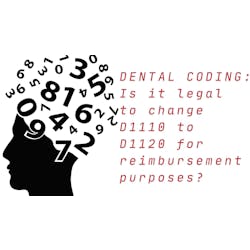Consider reading: The complete 2012 RDH eVillage salary survey for dental hygienists
http://www.dentistryiq.com/articles/2012/11/the-complete-2012-rdh-evillage-salary-survey-for-dental-hygienists.html
Consider reading: DANB's 2012 Salary Survey: CDAs still earn more than non-CDAs
http://www.dentistryiq.com/articles/2012/09/danbs-2012-salary-survey-cdas-still-earn-more-than-noncdas.html
Consider reading: Have hourly rates taken a hit in your state?
http://www.dentistryiq.com/articles/2012/10/rdh-evillage-salary-survey-part-3-have-hourly-rates-taken-a-hit-in-your-state.html
The market became flooded when new dental hygiene schools were erected and began churning out graduates in record numbers. Employers had their pick of candidates, including dental hygienists willing to work for less money in order to survive a crushing economy.
Is it true? Did the flood really happen?
RDH eVillage reported in its annual salary survey last fall that hourly rates have fallen by as much as $7 per hour since 2011.
On the other hand, the trigger for the decline would have to be the unemployed recent graduate. Among other statistics, RDH eVillage compared the hourly rates for hygienists who graduated before and after the economy turned sour in late 2007. The 2012 median hourly rate for dental hygienists who graduated after the recession started in 2007 is $34 an hour. The same statistic for hygienists who graduated before 2007 is $35 an hour.
A buck, though, can add up to more than $1,500 a year for a full-time hygienist.
RDH eVillage noted declines in hourly rates in Arizona, Colorado, Florida, Georgia, Illinois, New Jersey, Oregon, Pennsylvania, and Wisconsin.
“We were probably most surprised by New Jersey, since the state seemed to flourish during the recession, along with the rest of the New York City region,” the e-newsletter said on Oct. 5.
The median numbers reported above reflect the middle ground for the entire country. The average hourly rate in California was $49.18, an increase of 30 cents from 2011. The average hourly rate in Washington was $43.81, an increase of 16 cents.
But our eyes focused on the East Coast, too, since Maryland and Virginia also seemed to be offering less worrisome working conditions, particularly around the District of Columbia. An increase of $3.07 (from $38.80 to $41.87) was noted in Virginia. An increase of $1.35 (from $41.55 to $42.90) was noted in Maryland.
The largest decreases in hourly rates appear to have occurred in Colorado ($1.39 an hour less), Georgia ($1.26 an hour less), and Pennsylvania ($1.11 an hour less).
Visit RDH magazine’s website (www.rdhmag.com) to view statistical information on all 50 states.
The RDH eVillage articles posted on Sept. 14, Sept. 28, and Oct. 12 provided a few comments from survey participants. The comments traditionally appear in the January issue of RDH magazine. In 2012, dental hygienists offered opinions along these lines. (455 of the 1,279 survey participants offered opinions about salary trends in the profession, so only a sampling of those comments is provided below.)
The job market
- “I live in southern Illinois, and I’ve been an RDH for three years and cannot find a full-time job anywhere within 90 minutes of where I live. It is very disappointing; I am now in nursing school.”
- A Pennsylvania hygienist said, “There are lots of dentists in the area, but they have cut back on having full-time hygienists. They only want to hire hygienists part time. As hygienists, we have to find two or more dentists to work for in order to work full time. And there are way too many hygienists in the area. I drive over an hour to work at one office to make up a full-time schedule each week, and full time is on average only 33 to 35 hours a week.”
- A California hygienist said, “It is extremely difficult to find a dental hygiene job in my area. It has been over 18 months since my last permanent job. I do occasional temp work but must commute 80 minutes one way. I relocated to this large metro area from a small town, so I do find occasional temp work due to my reputation and networking in that area. In this metro area I have been on unemployment assistance for over six months. I would much rather find work within my profession. This area suffers from an overabundance of dental hygienists and dental hygiene schools. I truly enjoy being a dental hygienist and would like to stay in my profession.”
- A New Jersey hygienist said, “I was let go from my practice of 20 years when business went sour, and I was making $51 an hour. Now for four years I’ve been making $42 an hour with no chance of a raise in the near future! Ouch! The area is flooded with hygienists, and I’ve been in practice for 35 years. It hurts to receive the same compensation as a hygienist just out of college with a two-year degree. I think there are too many programs for not enough jobs! Perhaps a four-year degree should be required for all grads.”
- A Virginia hygienist said, “We have two community colleges graduating 16 to 18 RDHs a year, and another batch is unwittingly signing on this fall. We have over 25 RDHs collecting unemployment. There are many new grads who have never found work who aren’t eligible for unemployment. Those who do find jobs accept $25 to $28 an hour. In this area, we used to see $35 an hour. Most RDHs with jobs are working less than they want to or are working in multiple offices. Dental offices make a point of employing RDHs part time to avoid paying benefits. It’s a sad time for the profession. We need the schools to recruit from outside the area. I’d love to see the supervision requirements change so we can offer hygiene clinics where our experience and expertise can serve our patients’ needs.”
The effect of the economy on dentistry
- A Pennsylvania hygienist said, “Due to the economy, we’re seeing more and more patients leaving our office to go to ‘participating’ offices, even if they know the quality of dentistry may be less than what they’ve received before.”
- Florida hygienist said, “Since I started working for this dentist seven years ago, the office has cut hours of operation due to the slowing of business. I only work 27 to 30 hours a week (3.5 days). The front desk is having a hard time filling my schedule. The doctor has even changed me from 50-minute appointments to 60-minute appointments.”
- An Idaho hygienist said, “There is an overabundance of dental hygienists in the area due to way too many schools in the area. This is bringing down the hourly pay. Benefits are almost nonexistent due to employers taking advantage of the situation. If we think it’s bad now, just wait until the new health care reform comes out and people have to pay for their own dental insurance. Dental offices are going to be really hurting.”
- A Michigan hygienist said, “I work in two general practice offices that are very different from each other. One is large with three dentists and a very large staff. The other has one dentist, a small staff, and is slow-paced. Both offices were impacted by the economy and general reduction of dental benefits offered by employers, especially in the auto industry. However, both offices are recovering, doing fine, and have not had to reduce the staff or the hours and days the offices are open like many offices in my area. I actually consider myself lucky in that regard.”
Salaries
- A Wisconsin hygienist wrote, “I absolutely love the dental hygiene career! I would never change due to money issues, but it is extremely frustrating deal to with. The job I’m in now pays less than my very first job after graduation. Because of this I always keep my eyes open for other offices that are hiring in hopes of finding one I can stay with for many years, with pay I find reasonable.”
- “I’ve actually taken a $4 cut in hourly pay to keep my job. Not only are we competing with new graduates from several area programs for positions in Florida, we’re also competing with all the incoming foreign dentists who are not qualified to practice in the U.S. but are deemed qualified to be dental hygienists. Many dentists here are using this to their advantage. If you’re not willing to work for this wage, ‘there are 200 or more out there that will.’ Salaries are definitely declining in Florida. Dental hygienists are no longer treated with the professional respect they once were.”
- An Illinois hygienist said, “[The job market is] saturated to the point of drowning us. I feel dentists have taken full advantage of this fact. Hygienists will take $7 to $8 less per hour just to land a position. I feel it is very degrading, especially since I have over 15 years of experience.“
Raises
- A Texas hygienist said, “I haven’t had a raise since January 2007, since before the recession. Even though I’m producing more than I did that year, the practice as a whole has seen income flatten. So no incentives are possible except for a group bonus that doesn’t even come close to being fair for the sweat equity that’s we give in exchange.”
- An Ohio hygienist said, “In my case, our employer is still using ‘The Economy’ as an excuse not to give raises. No one in our office has received a raise in 3.5 years. Yet the doctors can afford new cars, house remodeling, and frequent vacations. Clearly, the economy is no longer affecting them, just their employees. We are all very bitter, but no one will leave because the job market is still not very good. So with no threat of anyone quitting, the dentists are able to continue not giving raises, and they also have reduced benefits — we only get one sick day per year, no CE reimbursement, no uniform allowance, and no increases in vacation days despite years of employment. I’m fed up!”
- A Massachusetts hygienist earning $40 an hour said, “The last time I got a raise I was told that I have maxed out for my position and I will not receive another raise.” RDH










